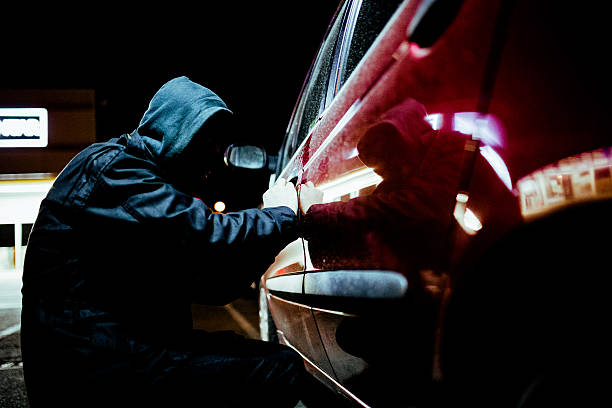What is the offence of car stealing? In NSW, car stealing (also known as car theft) involves the stealing of motor vehicles or vessels. Did you know that the NMVTRC reports that 70% of cars are stolen with their own keys and half are stolen from their home? The NMVTRC also reports that NMVTRC security technology has made it impossible to ‘hotwire’ a modern car or late model cars.
The Crimes Act 1900 (NSW) governs the laws on car stealing and this article discusses the topic of car stealing in NSW.
The Offence of Car Stealing in NSW
Section 154F of the Crimes Act 1900 contains the offence of stealing a motor vehicle, vessel, or trailer (or the offence of car stealing). For the offender to get a charge of stealing a motor vehicle, vessel, or trailer, the prosecution must prove beyond reasonable doubt, that the offender:
- took and carried (or drove) the unattended vehicle, vessel or trailer belonging to someone else away,
- did so with the intention of permanently depriving the owner of the motor vehicle, vessel or trailer, and
- did not have consent to do such actions.
Under Section 154E of the Crimes Act 1900, a “motor vehicle” includes a vehicle which a motor that forms part of the vehicle propels. On the other hand, a “vessel” means a watercraft of any description that’s capable of acting as a method of transportation on water.
Additionally, a “trailer” refers to a vehicle that is built to be towed, or is towed, by a motor vehicle, and is not capable of being propelled in the course of normal use on roads or road-related areas without being towed by a motor vehicle.
Penalties for Car Stealing
The law considers stealing a motor vehicle or vessel a serious criminal offence. Under Section 154F of the Crimes Act 1900, this offence carries a maximum penalty of 10 years’ imprisonment.
However, the Court can enforce other penalties in appropriate circumstances. After considering the nature of the offence, criminal history of the offender, and personal circumstances, a Court may determine that full-time imprisonment is unnecessary.
Should this be the case, the Court may impose other penalties such as home detention in which an offender will be under strict supervision Other penalties that a Court may consider include suspended sentences, community service, good behaviour bonds, or a fine.
Additionally, the Crimes Act 1900 also contains a more serious version of car theft: car-jacking. Under Section 154C, a car-jacking offence carries heavier penalties of up to 14 years’ imprisonment. Car-jacking, unlike car theft, happens in the presence and knowledge of the victim.
Which Court Hears Matters On Car Thefts?
Generally, the Local Court holds hearings on such offences, but even the District or Supreme Court can occasionally hold the hearing.

Car Stealing vs. Joyriding
People often confuse the offence of car stealing with joyriding. Joyriding is a lesser offence and is punishable with a maximum penalty of 5 years’ imprisonment.
The main difference between car theft and joyriding is that the former requires that the accused had the intention to permanently deprive the owner of the motor vehicle or vessel (which means the offender does not intend to return the stolen vehicles or vehicle).
On the other hand, Section 154A of the Crimes Act 1900 contains the offence of taking a conveyance without the consent of the owner (or joyriding). The Section states:
Any person who:
- without having the consent of the owner or a person in lawful possession of a conveyance, takes and drives it, or takes the car stolen for the purpose of driving it, or secreting it, or obtaining a reward for its restoration or pretended restoration or for any other fraudulent purpose, or
- knowing that any conveyance has been taken without such consent, drives it or allows himself or herself to be carried in or on it;
shall be deemed to be guilty of larceny and liable to be indicted for that offence.
The Section also provides that a “conveyance” means any cart, wagon, cab, carriage, motor car, caravan, trailer, motor lorry, tractor, earth moving equipment, omnibus, motor or other bicycle, tank or other military vehicle, or any ship, or vessel, used or intended for navigation.
Possible Defences to the Offence of Car Stealing
There are various defences to the offence of car theft. Some appropriate defences for the charge include:
- An honest claim of right. The offender believed that they had an honest claim of right to the motor vehicle. An honest claim of right means that the person has an honest and genuine belief that they have a legal entitlement to the property of another. The belief should not come from wishful thinking, but it is not required to be reasonable either. So long as that person genuinely believes they have a legal claim to the property, they have a “claim of right”.
- Duress. The offender may claim that they were acting under duress. This involves the use of harmful threats such as death or grievous bodily harm in order to coerce an individual to participate in unlawful activities. If the offender can prove that they received a harmful threat which they believed would be acted upon if they did not participate in the offence, then the defence of duress may be raised.
- Necessity. The accused may raise the defence of necessity, which means that they engaged in unlawful activities to avoid a forthcoming threat from human or natural forces. They must prove that there was a sense of urgency, and the accused must truly believe that if they didn’t participate in the offence, they were facing “imminent peril” and “irreparable evil”.
- No intention to permanently deprive the owner. The accused may raise the defence that they had no intention to permanently deprive the owner. However, if there was no intention to permanently deprive the owner of their car, the accused can still be liable for the offence of joyriding. The lack of intention to permanently deprive the owner does not fully excuse the offender of their actions.

Seeking Legal Advice
It’s important for car owners to keep their car keys out of sight from potential car thieves. They should also make sure to lock their car doors and secure their garage to prevent car stealing.
But what about alleged offenders of car stealing? Perhaps you are facing a charge of stealing a car, but you did not intend to do so. If you are facing a charge of car theft, we highly advise seeking legal services.
JB Solicitors has a leading team of experienced lawyers in criminal law. We have dealt with numerous criminal law cases and can help with your situation. Our solicitors offer legal advice and can discuss possible defences with you. We also provide legal representation should the matter escalate to the Courts.
Do you have more queries on car stealing and car security for traditional and modern cars? Contact us today.
